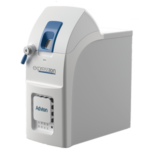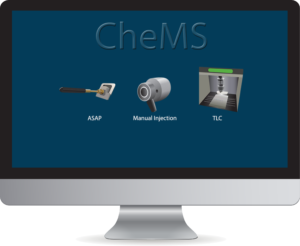In this Lab Manager webinar, Dr. Daniel Eikel, Advion Director of Product Applications and Customer Service reviews the use of the Advion expression Compact Mass Spectrometer (CMS) for food and beverage analysis.
As an attendee, you will learn more about:
- How leading technologies and techniques affect food science researchers
- How to establish workflows that optimize the efficiency of your food science lab
- New and novel applications in the field of food and beverage science
The cannabinoid makeup of cannabis has significantly changed over the past few decades. Efforts to increase the psychotropic effects of cannabis have resulted in a THC content for current strains of the crop of 30 to 40 percent compared with only 5 percent 30 years ago. Up-regulating the THC content of the plant causes a loss of other cannabinoids the plant is producing. Some of these other cannabinoids, such as CBD, are believed to be responsible for its medical benefits.
Furthermore, no pesticides can currently legally be used during the production process. However, a recent test showed that two out of three samples of legal cannabis samples had pesticide residues above the legal limit for an edible. Once sample exceeded the limit by a factor of 1,600. Such a sample poses a consumer health risk and clearly shows the potential for illegal growing procedures or unclear product streams in the marketplace.
Additionally, cannabis contains more than 400 chemical compounds, 80 of which are unique to cannabis. This fact, plus the finding of cannabinoid receptors in human nerve, immune and brain cells explains why this product is such an interesting target for medicinal use.
This webinar examines three different workflows surrounding compact mass spectrometry as they apply to cannabis law enforcement, it’s natural product research, and product control.
In this webinar, Advion’s Scientific Founder, Jack Henion, Ph.D., will discuss his research using a direct analysis probe coupled with the expression CMS to analyze chemical compounds in Cannabis.
During this webinar you will learn more about:
- A simple, sensitive and selective ASAP sample introduction approach to measure the presence and relative quantitative composition of two isobaric compounds, CBDA and THCA, contained in a complex sample such as hemp or cannabis plants or their corresponding extraction products.
- Measurement of differences in the relative composition of CBDA and THCA fragment ions originating from the same precursor ion.
- Applicability to screening plant and plant product materials such as hemp or marijuana to monitor out-of-specification composition.This webinar was featured by Lab Manager’s Tech Trends webinar series, “Tools for the Cannabis Testing Lab.”
This webinar was hosted by Lab Manager and recorded 4/11/19.
Thanks to the diminishing size and cost of mass spectrometers, coupled with their increasing robustness and ease of use, universities are now starting to furnish their undergraduate chemistry laboratories with this advanced analytic tool.
“My favorite learning environment is the laboratory,” explains Paul A. Flowers, professor of analytical chemistry at University of North Carolina at Pembroke. “I like teaching students fundamentals through bona fide research experiences.” Flowers began using mass spectrometry in the teaching laboratory about six years ago and hasn’t looked back.
Learn more about the integration of mass spectrometry for teaching with this free whitepaper.
The expression® CMS provides essential information quickly and improves the chemist’s workflow by using a direct analysis probe, otherwise known as ASAP® (Atmospheric Solids Analysis Probe) permits chemists affordable and reliable sample analysis of solid and liquid samples such as reaction mixtures, food samples, natural products and tablets.
Chemists simply dip the closed end of a glass capillary into the sample of interest (even complex mixtures) or scrape the surface of a solid, and then place the capillary into the CMS for analysis. Clean-up and analysis is a single step. Involatile buffers and salts remain on the capillary ensuring they do not suppress ionization or interfere with the measurement, while the compounds of interest are identified by the CMS.
Advion’s direct atmospheric solids analysis probe, otherwise known as ASAP®, permits chemists fast and reliable sample analysis of liquid and solid samples such as reaction mixtures, food samples, natural products and tablets.
Advion’s expression® CMS paired with the Atmospheric Solids Analysis Probe (ASAP®) can quickly and easily be used to screen an unidentified drug mixture in this mobile field testing dramatization.
Reaction monitoring is a key aspect in a range of chemistry environments from chemical synthesis to drug discovery to understanding natural products to protein synthesis. Understanding the optimal time to quench a reaction for maximum yield, as well as monitoring a reaction in real-time is vital to many medicinal and synthetic organic chemists. Advion Interchim Scientific’s expression® CMS was developed with the chemist in mind to optimize their workflow directly at the bench. It is an easy-to-use and maintain single quadrupole detector that integrates with the industry’s broadest range of innovative sampling techniques from direct probe analysis to ultra-high performance liquid chromatography. Users can rapidly switch between the many different sampling techniques required throughout the chemist’s workflow.
In this webinar, Heather Walker from Sheffield University’s plant production and protection team explains how taking a compact mass spectrometer from the lab to the field helped optimise the team’s research.
The webinar highlights the advantages of mobile mass spectrometry, and introduces a mobile mass spec vehicle that has been outfitted to optimize time in the field without sacrificing results for real-time decision making about sampling.
During this webinar you will learn:
- about fast and easy sample techniques available with compact mass spectrometry, including direct probe for liquids and solids, and a volatile headspace analysis tool – both with no sample preparation required
- how instant data can be obtained to provide real-time decision making, allowing for smaller sample sizes to optimise reproducibility – without the need to oversample with the intent of bringing samples for off-site lab testing
- how the metabolic profile of wheat can be measured via compact mass spectrometry, highlighting the success of the technology in the food and ingredients testing industry
This webinar is brought in association with Advion and will feature presentations from Advion’s scientific founder Jack Henion and Sheffield University’s Heather Walker.
 Bring mass spectrometry into your classroom for remote or on-site learning with a training course for the expression® Compact Mass Spectrometer (CMS).
Bring mass spectrometry into your classroom for remote or on-site learning with a training course for the expression® Compact Mass Spectrometer (CMS).
Advion offers an affordable MS teaching package that includes:
- A compact, easy-to-use benchtop mass spectrometer for both students and researchers
- Recorded lectures and video lab content
- Lecture slides to share or adapt to your own teaching style

PLUS: Easy, student-friendly software. Select the workflow, the type of compounds, and students are on their way with just a few clicks of the mouse.
A research-grade mass spec, the expression® CMS is ideal for teaching because of its small size, ease of use, and one-click software. When class is not in session, the system is ready for research, making this a versatile choice for university labs seeking state of the art equipment paired with streamlined teaching modules.

 Bring mass spectrometry into your classroom for remote or on-site learning with a training course for the expression® Compact Mass Spectrometer (CMS).
Bring mass spectrometry into your classroom for remote or on-site learning with a training course for the expression® Compact Mass Spectrometer (CMS).